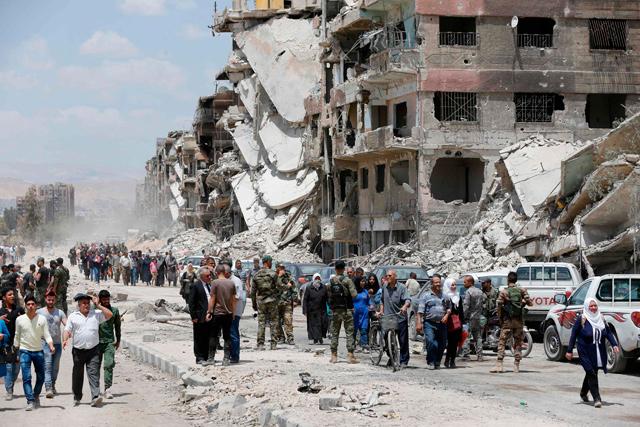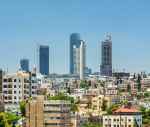You are here
Syrian development plan alarms refugees and host nations
By Reuters - May 27,2018 - Last updated at May 27,2018

Civilians and pro-government forces walk down the destroyed Thalateen Street in the Yarmouk Palestinian refugee camp on the southern outskirts of the capital Damascus, on Thursday (AFP photo)
BEIRUT — A new law allowing the Syrian government to redevelop areas devastated by war has alarmed refugees and the countries that host them, prompting fears that people will lose their property and be less likely to return home.
Seven years into the war that has killed half a million people, the law signals the government's intention to rebuild areas of Syria where the rebellion has been defeated, even though large parts of the country remain outside its control.
"Law 10" came into effect last month as the army was on the brink of crushing the last insurgent enclaves near Damascus, consolidating President Bashar Assad's grip over nearly all of western Syria.
The law allows people to prove they own property in the areas chosen for redevelopment, and to claim compensation. But aid groups say the chaos of war means few will be able to do so in the time specified. The law has yet to be applied.
People forced to flee their homes — more than half the prewar population — will find it hard to make such claims, aid groups say.
Many refugees now face a major problem: whether to return home, even if they think it may be unsafe and claim their property rights in person, or risk losing them, along with a big incentive to go back to Syria in future.
"If it is applied to areas once held by the opposition from which the residents have been displaced, or where land registries have been destroyed, it will in effect prevent the return of refugees," said a briefing note circulated to EU states at a recent high-level meeting.
Lebanese Prime Minister Saad Al Hariri, whose country hosts more than a million Syrian refugees, said this week that the law "tells thousands of Syrian families to stay in Lebanon" by threatening them with property confiscation.
Assad says the law has been misinterpreted in order to inflame Western public opinion against his government. He told the Greek newspaper Kathimerini that the law "is not about dispossessing anyone".
"You cannot, I mean even if he's a terrorist, let's say, if you want to dispossess someone, you need a verdict by the judicial system," he said.
Assad's opponents already accuse him of engineering "demographic change" by driving rebels and their families out of Syria's cities, and say the law confiscates property and homes of the displaced.
Amnesty International has said it effectively deprives thousands of people of their homes and land.
Why did Syria
pass Law 10?
Managing the reconstruction of ruined cities, vital for Syria's economy, will grow more important for Assad if he is to turn battlefield victories into a full restoration of his rule.
Experts on post-war reconstruction have likened it to laws passed in other war zones, notably in Beirut after the 1975-90 civil war.
Assad is banking on allied countries, chiefly Russia and Iran, to help with reconstruction as Western states say they will not contribute until a political transition is in place.
Western Syria's main cities — Damascus, Aleppo, Hama and Homs — are now entirely in his hands, but apart from Hama they each have entire districts in ruins.
However, rights groups, including Amnesty International, accuse Assad of conceiving Law 10 to push his opponents from their homes, since Syria's most damaged areas were major centres of the uprising.
"If enacted, this law could be used to implement a breathtakingly efficient feat of social engineering. Thousands of Syrians — mostly those in pro-opposition areas or who have sought refuge abroad — risk losing their homes because their documents are lost or destroyed," said Diana Semaan, Amnesty International's Syria researcher.
Why will it particularly affect refugees?
Many refugees owned property in Syria but they will find it more difficult to stake their claims than people who stayed.
The Norwegian Refugee Council has said 67 per cent of refugees it had interviewed said they owned property in Syria, but only 17 per cent of them still had ownership documents.
Another big worry is the law's time frame.
Once a local authority announces a redevelopment plan — and none have yet done so — people will have 30 days to submit ownership claims, making them eligible for compensation.
Government supporters say protections for property owners are generous: family members or people given power of attorney can make claims and appeal decisions on behalf of absent owners.
But after years of a war in which government buildings have been destroyed along with their files, and in which people have lost identity cards or land deeds as they fled, it could take months to prove who somebody is — let alone what they own.
For refugees abroad, getting power of attorney under Syrian law for a friend or relation back in Syria, even if they both have all the right documents, takes a minimum of three months. It also requires security clearance — potentially a problem for people who fled districts that were opposition centres.
Related Articles
BEIRUT, Lebanon — Rights groups and specialists are sounding the alarm over a new Syrian law on urban development, saying millions of displa
BEIRUT, Lebanon — Lebanon expressed concern to Syria on Saturday over a new law aimed at redeveloping areas devastated by seven years of war
BEIRUT — Syria has told Lebanon it wants refugees to return to help rebuild the country, its envoy to Lebanon said on Monday, after Beirut e



















